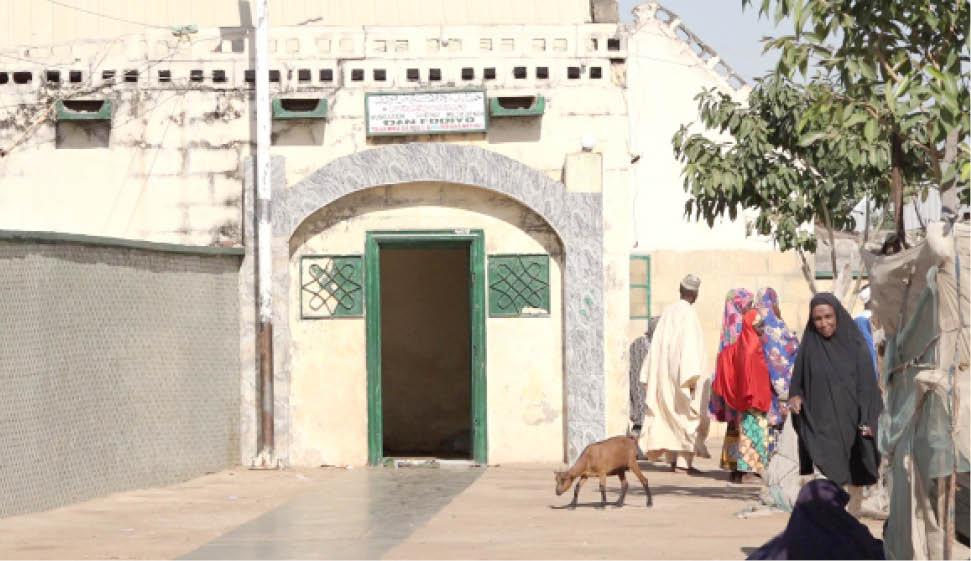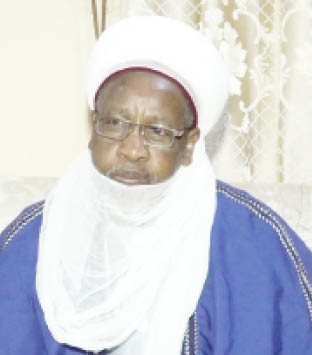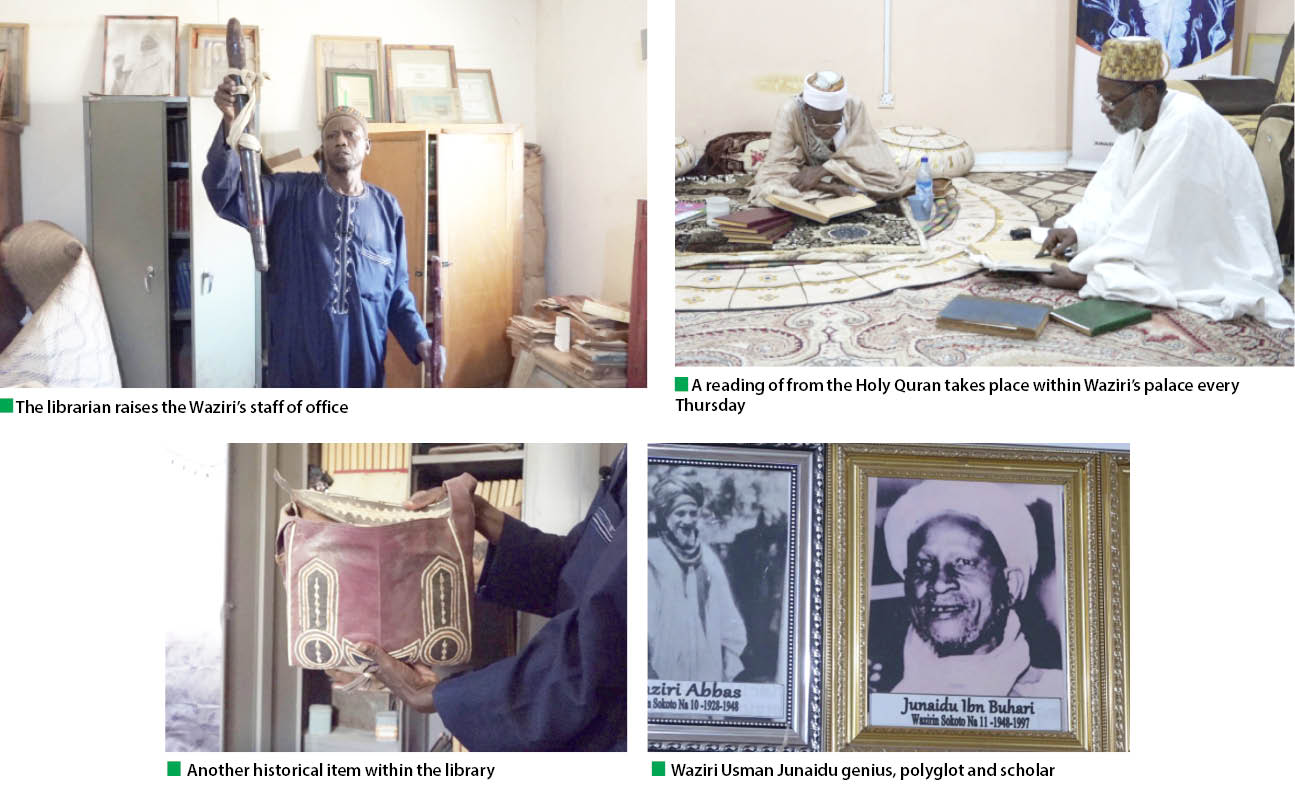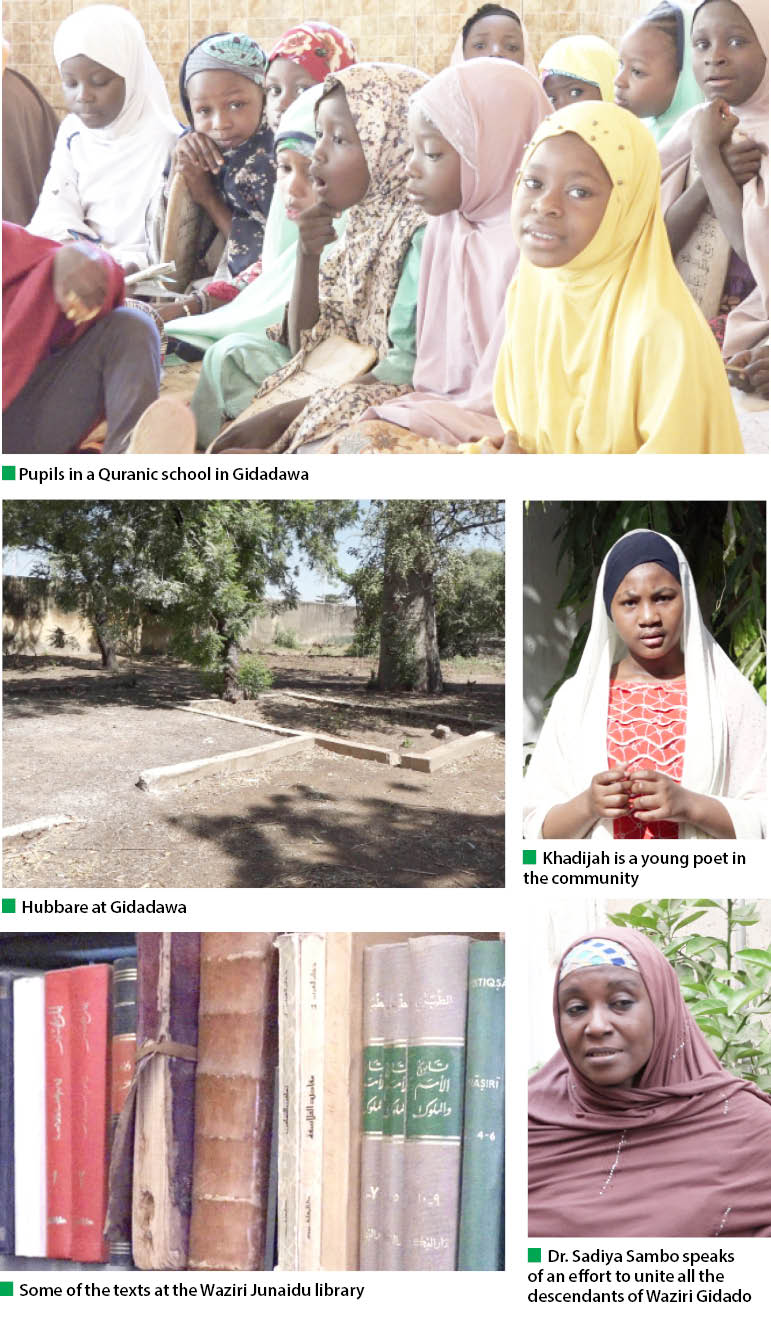Inside Sokoto community of scholars
Near the palace of the Sultan of Sokoto is the area known as Gidadawa. Within Gidadawa there is another palace. This is an interesting point. Here are two palaces in close proximity to each other. 19th century roots Gidadawa’s origin goes back to the beginning of the 19th century. Prof Abdulkadir Junaidu, the Sokoto State […]

The Hubbare at Sokoto
Near the palace of the Sultan of Sokoto is the area known as Gidadawa. Within Gidadawa there is another palace. This is an interesting point. Here are two palaces in close proximity to each other.
19th century roots
Gidadawa’s origin goes back to the beginning of the 19th century. Prof Abdulkadir Junaidu, the Sokoto State Commissioner for Animal Health, who hails from the community, said, “The word Gidadawa refers to a particular area in Sokoto metropolis, Sokoto North Local Government Area, named after our great grandfather, Waziri Gidado. It is expanded to Gidadawa, which means descendants of Waziri Gidado, the Waziri of Mohammed Bello.”
Great Islamic scholars
This community is associated with scholarship, depth in Islamic knowledge and a humble determination to excel. Professor Junaidu added, “At the mention of Gidadawa, what strikes people most is scholarship because the area has been known to produce great Islamic scholars. With the modern changing times, it has also produced lots of academicians within the state. That is why the community is highly respected by the indigenes of the state.”
Highly educated
Professor Sambo Junaidu, Wazirin Sokoto, explained, “The name Gidadawa is synonymous with education. When you say that this person is from Gidadawa, people believe he must be highly educated, even if that is not the case.”
A burden is borne by those who originate from this part of Sokoto. M.I Junaid of the Department of Education (UDUS) and son of the famous Waziri Junaidu, said, “It is a big responsibility to be able to advise the Sultan, put him on the right track, check his excesses, and so on.
“Coming from that family you have to be knowledgeable to be able to give good advice. You have to be of good character, then you have to be humble at the same time because knowledge goes with humility.
“Coming from that family, everybody is looking up to you to be knowledgeable, highly educated, responsible, of good character and so on. Even when you wish to be like another person, you have that at the back of your mind that you are coming from a particular background and you have to live to the expectation of people. It is a big burden to carry throughout your life.”
New naira: Kaduna directs hospitals to accept cash transfers
Building collapse: FCT minister orders arrest of FHA officials, developer
Pioneer professors
Interestingly, most of the pioneer professors of Sokoto hail from Gidadawa. Dr Usman Abdulqadir of the Department of Sociology, Usman Dan Fodio University, Sokoto (UDUS) said, “Most of the professors in Gidadawa are the pioneers of Sokoto. The present Waziri is the first professor in Arabic. M.I Junaid, first professor in Education. Abdulkadir Usman Junaidu, first professor in Veterinary Medicine. Professor Mukoshy, Professor A.B. Yahaya, all these are the pioneer professors in their own fields. We are coming after them. I am an associate professor in Sociology of Law. You find that young professors are emerging in Gidadawa, very young people in their early 40s.”
70% of professors from Gidadawa
Abubakar Mohammed, the Head Civil Service, Sokoto State, said, “Of all the professors in Sokoto metropolis, about 70 per cent of them are from that particular neighbourhood. For the first time in the history of the caliphate, you have a professor as Vizier. One of his younger ones is a professor. One of the Waziri’s sons is a professor.”
Waziris of Sokoto
This quiet community always produces the Waziri of Sokoto. Prof Abdullahi Yahaya of the Department of Biochemistry and Molecular Biology, UDUS revealed, “Historically, the house of Waziri is always associated with knowledge and intellectualism from the Waziri Gidado, who is the founding father of the Gidadawas and the house of Waziri. He is an erudite scholar, a disciple of Shehu Usman Dan Fodio and a friend to Sultan Mohammed Bello. The position of Waziri itself is that of adviser to the Sultan, as well as the prime minister.”
Expansion of Gidadawa
Today, Gidadawa has expanded beyond its physical borders. Abubakar Mohammed said, “As a young man growing up, when they said Gidadawa, it meant Waziri’s residence, the courtyard. Somebody from Bazza would say ‘I am going to Gidadawa,’ and that’s what he meant – the courtyard, the residence. But now, you can see that it has expanded. Now, you find the Gidadawa in Waziri A, Waziri B, Waziri C, and now, More, which is in Kware. Now, all the enclaves under Wazirin Gidado’s supervision were seen as Waziris enclave. It grew from just being the courtyard of Waziri and the household to Waziri A, which encapsulates all the neighbourhood around. It expanded to cover Bazza, and now, you cross over to Gangare, which is Waziri C. It has gone to More.”
Marriage within the family
Marriage within a group, which is popularly known as endogamy or auren zumunta in Hausa, is common in the Gidadawa community. Ibrahim Abbas Bashar, a lecturer in the Translation Department, Umaru Aliyu Shinkafi College of Education, Sokoto, said, “An endogamous marriage is within the family. It originated right from when Gidado married Nana Asmau and had five children with her. The first born was Wazirin Abdulkadir, and Ahmed, then Usman, Abdullahi Bayero and Laima. These are the five children they had. Ahamed, the second son of Nana Asmau, married Buhari Dan Shehu’s daughter, who is Nana Asmau’s elder brother from the same father, the children of Usman Dan Fodio.
That is the genesis of where the endogamous marriage started. So, when Ahamed married Buhari’s daughter, they gave birth to two children, Muhammadu Buhari and Muhammadu Sambo. All of them were Waziris of Sokoto.”
Common features, diseases
Bashar, who is writing a book on the Waziris of Sokoto, said Wazirin Junaidu encouraged endogamy in Gidadawa during his era.
Commenting on the impact of endogamy on families he said, “We have common features; even on the health ground you will see there is one common disease like losing sight. At times losing eyesight is common; the same thing with intellectual gifts. You hardly find a house where you don’t find talented people.”
He also spoke on other forms of marriage in Gidadawa, saying, “Apart from marrying within the family, we do marry from the Shehu family, right from Nana Asmau, daughter of Usman Dan Fodio, and most of her children and descendants marry also from other houses within the Shehu family.”
The Wazirin Junaidu Library
The Wazirin Junaidu Library, comprising books that date from 200 years ago, is an interesting place to visit. It is striking that scholars in Sokoto in the 19th century were discussing works of Euclid, a Greek mathematician famous for his treatise on geometry.
Manuscripts, books, photographs
Muhammadu Wadata Balarabe, the librarian said, “This library is the personal property of Dr Junaidu. After his demise it has been taken care of by subsequent viziers, the Waziri’s.
The library now is in the hands of the family of Dr Junaidu. They inherited it from him but gave it for the consumption of the public. The library consists of so many things, including manuscripts, both old and new, books, photographs, and many other things that are relevant to our historical heritage.”
A tomb (Hubbare) containing the remains of Wazirin Junaidu and previous Waziris can be seen within the palace.
Every evening, with the exception of Thursdays, the Wazirin reads from the Holy Quran within his palace, as well as from a number of texts written by the Fodio’s. This reading has been going on at the same spot for well over 200 years. Each reading lasts for about 20 minutes and is usually followed by questions asked by those present.
Nana Asmau
Nana Asmau’s memory is alive in Gidadawa. She was born in 1792 to Maimuna, wife of Usman Dan Fodio. In addition to many gifts, she could speak Arabic, Hausa, Azbinanci and Fulfulde.
Dr Sadiya Sambo, lecturer, Shehu Shagari College of Education, Sokoto, went down memory lane thus, “From the cradle, among the Gidadawa the most important thing is quest for knowledge. From their great grandfather, all his wives are scholars, Shehu Dan Fodio. Nana, from a tender age she got a lot of knowledge from her father and his two wives. They mentored her because she lost her own mother. They taught her Qur’an, they taught her Fiqh.
“Nana got this knowledge from her father, stepmothers, brother, Mohammed Bello, the first Sultan of Sokoto, after Shehu Dan Fodio. She learnt from them and her husband, Usman Gidado, who she was also related to.
Nana Asmau’s life was all about learning. Nana started disseminating knowledge through poems. So she’s a poet. She got married at the age of 14 to Wazirin Gidado and gave birth to six children. One text states that upon the passing of Gidado, Asmau’s son became the Wazirin and all Waziri’s thereafter have been her descendants.
Wazirin’s staff of office
There are some important relics from the past, including the Wazirin’s staff of office. Balarabe continued, “This is the staff of office of the Wazirin, it is a quiver where arrows are kept. It was given to the second Vizier Gidado bin Laima by Abdullahi bin Fodio, the Emir Gwandu, as a sign of his Viziership, together with this bow and other things, which signify his office. This sword and other items are all part of things used as emblems of the Wazirin’s office; they are signs of his Vizierate.”
Quranic schools
Behind the Wazirin’s palace is a Quranic school, and there are quite a number of such institutions in the community. We visit early in the morning. The pupils are already seated and reading from their boards. The teacher or Mallam is present and guides the pupils from time to time.
Descendants of Gidado
An attempt has been made to create a forum uniting all the descendants of Wazirin Gidado. Dr Sambo said, “The family is a wide one, but since 2016 we have started uniting. We wanted to create a forum such that we know our lineage by direct descendants. For instance, I descend from the Wazirin Abdulkadir’s house. There are those that descended from the Wazirin Halilu house. There are also that those descended from the Wazirin Abbas house. We want to unite. Those great grandchildren will call themselves Gidadawa, not knowing directly which line they descended from. We are trying to bring back that history. The larger family of Gidado has many branches. Some bear the name, Junaidu, some do not.
“We have categorised ourselves. Today, we have researched almost 34 different houses, and from those houses we picked the eldest person. Initially, we used to meet every month, but with Corona now we are not meeting every month.”
Departure from the norm
There is a sense in which Junaidu Usman Junaidu is a departure from the norm. Instead of going forward to get a PhD and become a lecturer, for instance, he turned to information technology (IT) business with the support of his family. He is a specialist in computer programming and has an IT company in Sokoto.

Usman Junaidu said, “My plan is to move into manufacturing of computers and other IT-related equipment, not only in Sokoto but the whole country. If you look at the back of this building you would see a structure. We have partnership with some companies, some from Lagos and Dubai, trying to see how we can manufacture.”
Soft copy of jihad literature
He is working on an exciting project that aims at scanning all the works of Usman Dan Fodio, Abdullahi Dan Fodio, Mohammed Bello, Nana Asmau, and creating an easily accessible digital copy. He has 10 graduates of Computer Science working with him on the project.
Junaidu Usman Junaidu added, “We want to see a situation where we can combine English, Arabic and some Nigerian languages – Hausa, Igbo and Yoruba, a situation where we can develop an operation system that can work, operate with these five languages. This will be on computer.
“With regard to the phone, we started work, a project related to my family. When I look at the historical equipment we have there in the house, in the Wazirin Junaidu history and culture bureau, some of them have been misplaced. So, I want to see a situation where we can transform them into a soft copy. I have designed a website you can browse through the website, search anything you wish to search with regard to the family.”
History bureau
Sokoto’s History and Culture Bureau is named after Wazirin Junaidu, an illustrious descendant of Wazirin Gidado. He learnt Fulfulde while in his 40s and committed to memory, all the works of the Fodios. In his lifetime he was regarded as the greatest living authority on the Sokoto Caliphate.
One source writes, “In spite of the fact that he lost his sight during his latter years, he could verify the etymology and reliability of a text by merely hearing it recited to him.’
Caliphal system whittled down
The position of the Waziri has changed over the years. M.I Junaid said, “The whole caliphal system has been whittled down by colonialism, new system of government introduced by the colonial masters. Although they relied heavily on the structures of the caliphal system, at the same time they gradually withdrew all the powers, the mandate from the caliphal system to the new system.
“Yes, the office of the Waziri has, of course, been whittled down, in terms of power, mandate and so on. But he is still there as the chief adviser of the Sultan. In those days, even under colonial times, the office of the Waziri was equivalent to an emir, the status was equivalent to a first class emir.
“The seat of the Waziri has also changed with time. And as you know, all the Waziris were educated. The current Waziri is computer literate; he uses mobile phones. He doesn’t have problem with that. People have changed, people also change to catch up with modern trends.
The Waziri of today is quite different from Waziris of 50 years ago, in terms of how they do things, what they use for writing and communication.”
Waziri like Prime Minister
Shedding light on the position of the Waziri, Prof Abdullahi Yahaya said, “We need to take into cognisance the fact that the role of the Waziri has significantly changed after the British conquest of the caliphate. Before now, the Waziri was like a prime minister, he was a very powerful person. Sometimes the Waziri would go to some of these emirates to install new sultans.”
Yan Taru
Nana Asmau established a group known as Yan Taru. Prof Abdullahi Yahaya elaborated on this, saying, “She established a system we call Yan Taru, a university system where she trained females that were always disadvantaged in terms of knowledge. They come from all the nooks and crannies of the caliphate. She trained them on Islamic knowledge, with the hope that they would go back to their respective places and disseminate the information. This had really helped in enlightening the people.”
Dr Usman Abdulqadir of the Department of Sociology, UDUS, also spoke on Yan Taru, saying, ‘They usually come to Sokoto to learn from Nana Asmau and so on, go back to Gwandu, Shagari, Bauchi, Adamawa etc. From Nana Asmau down to the 20th century, there are female scholars that continued from where Nana stopped.”

Rise of Gidadawa
Descendants of Wazirin Gidado have risen highly, not only in Sokoto but also nationally.
On this, Prof Abdulkadir Junaidu said, “I can boldly say that there’s hardly any house where you won’t find a graduate in Gidadawa, and in different fields. There is no field that you cannot find somebody from that community specialising in. We have lots of academicians – professors, PhD holders, and some technocrats.
“The current secretary to the government of Sokoto State is from Gidadawa, the current Head of Service is also from that community. We have three to four permanent secretaries from the community. Initially, three of us were commissioners, now we are two. We have former federal permanent secretaries, former ministers, permanent secretaries in the state service. This can be attributed to hard work and dedication and scholarship.”
Growing up
Many Gidadawa have exciting memories of growing up in the famous community. Dr Usman Abdulqadir, one of such people said, “In Gidadawa, hardly will you find somebody who will sit you down and counsel you on education. Right from the beginning you will see what we call anticipatory socialisation. Right from when you are growing up, your father, your senior brothers, all are in that line. It is inbuilt in you, so you don’t have anything apart from this pursuit of the intellectual, whether traditional, Islamic or western.
“Up till now, the beautiful thing is that we still maintain that culture of learning and scholarship; and the environment has helped a lot. If you go to college of education or polytecnic you find Gidadawa. Even in the administrative unit, Gidadawa people are coming up”’

Hussaini Malami of the Department of Economics, UDUS, also made a point about the community, saying, “Gidadawa has a long standing tradition in Islamic education. One of the main traditions there is that as soon as a child can walk outside the family house, the first thing they do is to introduce him to Quranic school.
On early days in Gidadawa, Professor Junaidu said, “The moment you open your eyes, it is book. That’s why at the age of two or three you are taken to an Islamic school. It can remodel and keep you prepared for the future. Once you have that background and you are going to the Islamic school, and you are attending the modern school concurrently. You are being educated both ways, and that will widen your mind into knowing so many things at a tender age and facing the challenges.”
Khadijah Junaidu’s parents hail from Gidadawa and both are professors. She is a poet and expresses themes and ideas which Nana Asmau – herself a famous poet – would have been proud of. Some of the younger generations in Gidadawa have expressed interest in IT, as well as becoming pilots. Others have manifested a stunning brilliance in a diversity of fields, even at a very young age. There is so much knowledge, promise and multidimensional talent in the quiet part of Sokoto, named Gidadawa.
